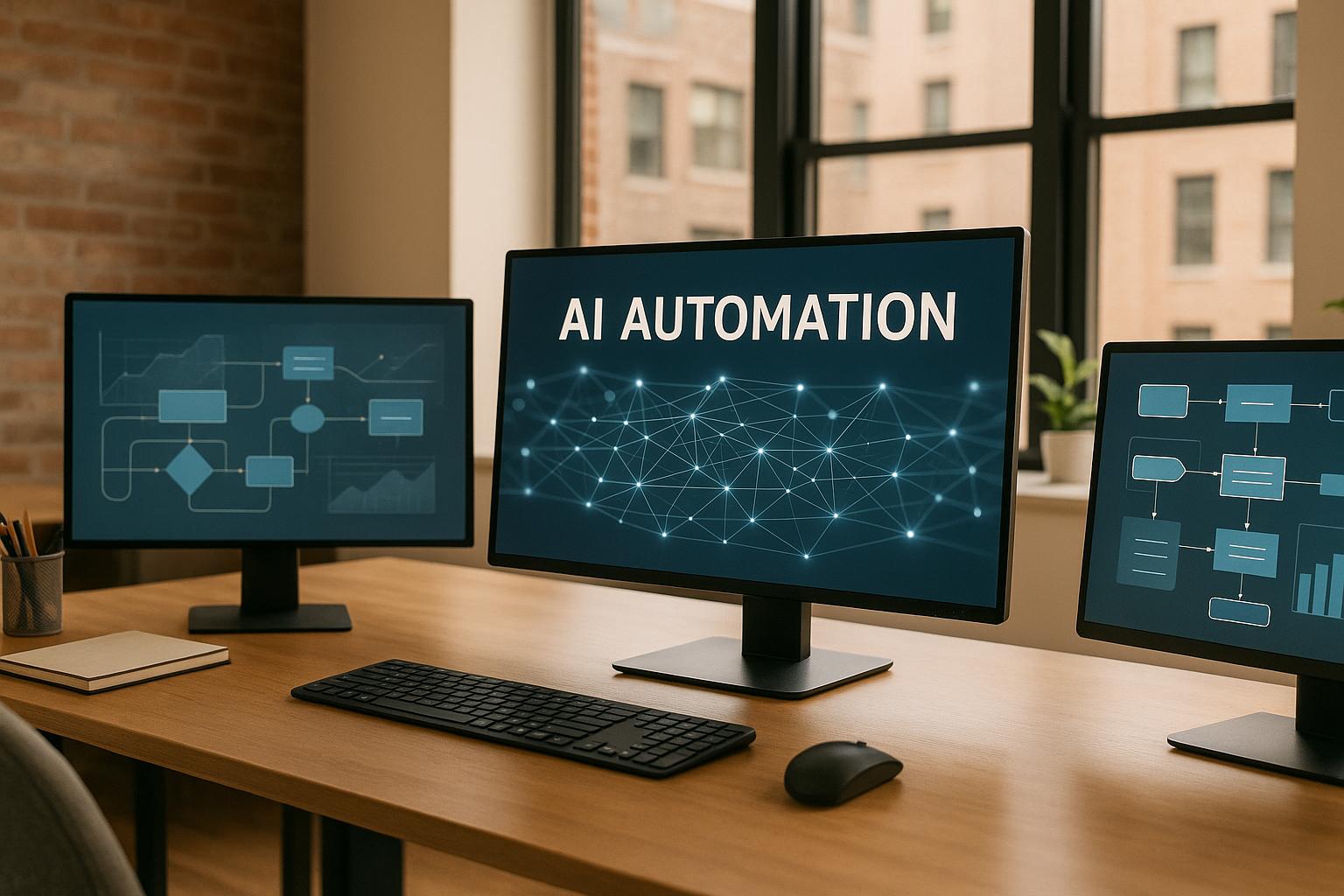
In the fast-paced world of AI, businesses need tools that simplify operations, cut costs, and ensure compliance. This article highlights five leading U.S.-based platforms revolutionizing AI workflow automation. Here’s a quick overview of what they offer:
These platforms cater to different needs, from cost-efficient AI integration to advanced automation in regulated industries.
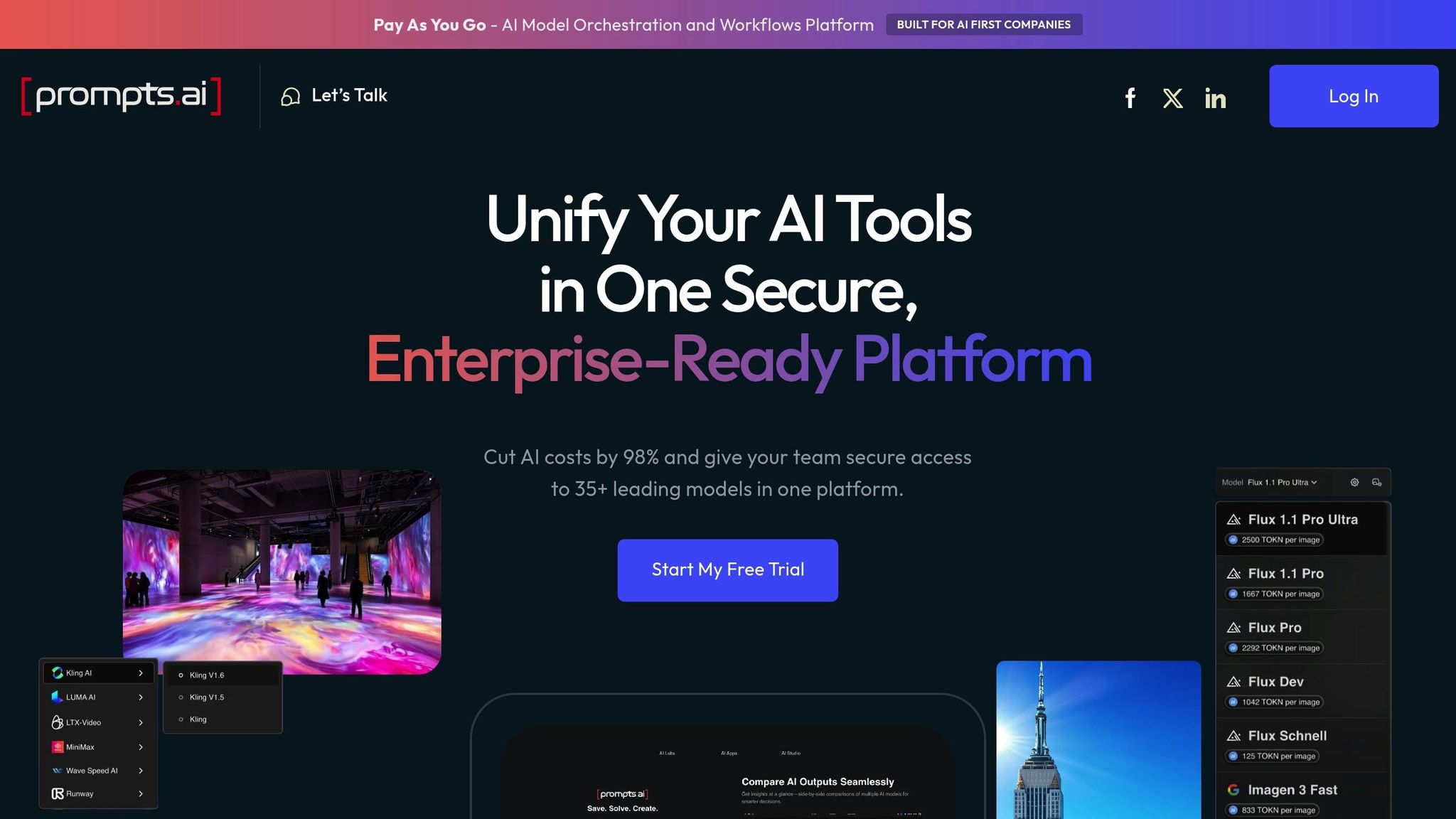
Prompts.ai brings together over 35 large language models (including GPT-5, Claude, LLaMA, and Gemini) into a single, secure platform. This U.S.-based solution is designed to streamline AI operations, cutting through the chaos of disconnected tools and reducing AI costs by as much as 98% through unified model selection and real-time cost management.
Prompts.ai is used across various industries, transforming one-off experiments into consistent, compliant workflows. Its customizable approach ensures that businesses can tailor processes to their needs, helping them maintain a competitive edge.
Prompts.ai stands out for its ability to connect diverse business systems through seamless integration. With a range of connectors and APIs, the platform integrates effortlessly with key business tools, enabling workflows that span departments and applications without the hassle of juggling multiple systems.
Using natural language processing, Prompts.ai allows users to describe workflow needs in plain English, which the platform then translates into customized automation frameworks. This user-friendly approach ensures that both technical and non-technical teams can create complex, multi-step processes with ease. Tasks like document processing, approval workflows, and cross-department data synchronization become straightforward and efficient.
These integrations are bolstered by robust security measures, ensuring smooth and secure operations.
Prompts.ai is built with enterprise security in mind, adhering to SOC 2 Type II, HIPAA, and GDPR standards to protect sensitive data. The company initiated its SOC 2 Type II audit process on June 19, 2025, reinforcing its dedication to top-tier security practices. A dedicated Trust Center (trust.prompts.ai) provides real-time updates on security measures.
With features such as end-to-end encryption, role-based access controls, and comprehensive audit logging, Prompts.ai is particularly suited for businesses in highly regulated industries like healthcare, finance, and legal services.
Prompts.ai tackles cost efficiency with its Pay-As-You-Go TOKN credits system, eliminating recurring fees and aligning expenses with actual usage. This flexible pricing structure allows businesses to start small and expand their AI initiatives as needed, avoiding the burden of fixed monthly costs.
The platform’s cloud-based design adapts automatically to changing workloads, ensuring consistent performance even during demand spikes. Real-time cost controls further help organizations align AI spending with their business goals, maximizing value without overspending.
This combination of cost management and scalability makes Prompts.ai a practical choice for businesses aiming to streamline their AI operations.
Prompts.ai supports advanced automation scenarios across a variety of business functions. For example, financial services firms can automate loan application processes by integrating data extraction, risk analysis, and compliance checks into a single workflow. Similarly, customer support teams can use AI-powered systems to classify and route inquiries based on urgency and complexity, speeding up ticket resolution.
The platform enables teams to deploy AI workflows faster than traditional automation methods. Business plans come with features like compliance monitoring, governance tools, and administrative controls to support enterprise-level implementation. This mix of speed, flexibility, and robust functionality makes Prompts.ai an ideal solution for organizations looking to integrate AI into their operations with minimal technical complexity.
Workato is a platform designed to integrate workflow automation and AI, helping businesses streamline operations effectively. Established in 2013 and based in Mountain View, California, it has become a go-to solution for organizations aiming to connect their business applications and automate intricate processes.
Notable customers include Slack, DocuSign, and GitLab. Workato's tools are built to empower both technical and non-technical users, enabling them to create automation workflows without the need for extensive coding expertise.
One of Workato's standout features is its extensive library of pre-built connectors, which integrate with widely-used business applications such as Salesforce, ServiceNow, Workday, and Microsoft Office 365. These connectors eliminate departmental silos, ensuring smooth collaboration across various teams.
The Recipe Development Kit (RDK) and a user-friendly drag-and-drop visual builder make it possible for users to design custom workflows. These tools even support the integration of older legacy systems and niche applications, expanding the platform's versatility.
Additionally, Workato incorporates intelligent data mapping and natural language processing to manage unstructured data effectively. This capability enhances automation while maintaining a strong focus on security throughout its architecture.
Workato prioritizes data security by adhering to rigorous standards, including GDPR, HIPAA, and PCI DSS. It ensures end-to-end encryption and implements role-based access controls to safeguard sensitive information.
The platform also provides detailed audit trails to track workflow executions, data modifications, and user activities - an essential feature for businesses operating under strict regulatory requirements.
For organizations with specific data residency needs, Workato offers on-premises agent deployment. This hybrid model allows businesses to retain certain data within their infrastructure while still leveraging the advantages of cloud-based automation.
Workato's pricing model is task-based, meaning costs are tied directly to usage. Its auto-scaling infrastructure ensures consistent performance by adjusting to workload demands automatically. This approach optimizes resource usage, whether during peak activity or quieter periods.
The platform's Recipe Lifecycle Management feature provides insights into workflow performance, identifies bottlenecks, and offers suggestions for improvement. These tools help businesses fine-tune their processes and maximize their automation investments.
Workato is particularly effective in managing complex business scenarios that require coordination across multiple systems and departments. Features like conditional logic, loops, and error handling allow organizations to build workflows capable of adapting to intricate requirements.
For instance, financial services companies use Workato to automate customer onboarding processes, including identity verification, credit checks, account setup, and compliance reporting. Similarly, HR teams rely on the platform to streamline employee lifecycle workflows, such as payroll updates, benefits administration, and access management. The platform's batch processing capabilities also enable businesses to handle large data volumes efficiently, whether for financial reporting or bulk communications.
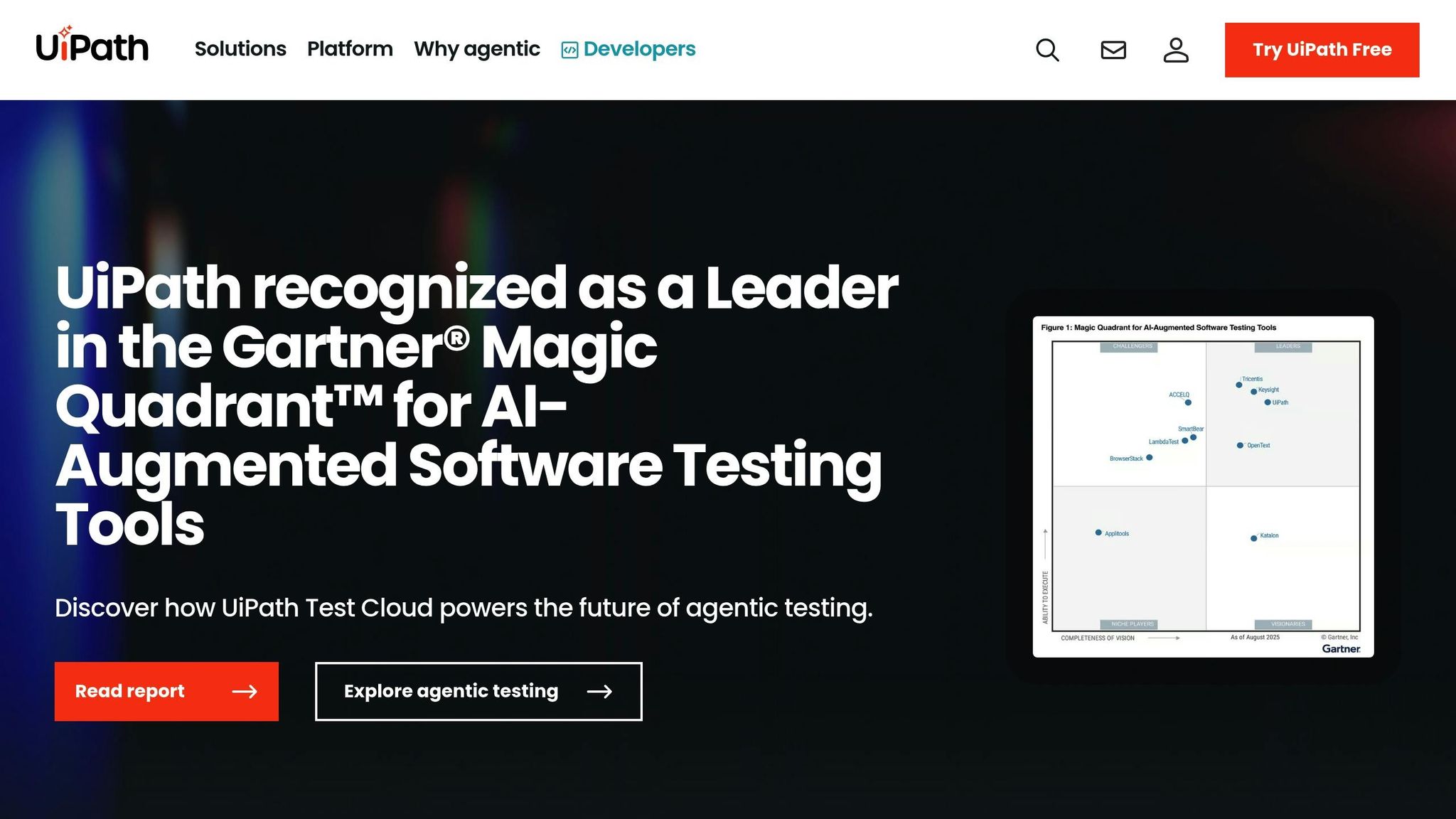
UiPath stands out as a leading robotic process automation (RPA) platform, blending traditional automation tools with cutting-edge AI to streamline workflow orchestration. Established in 2005 and headquartered in New York City, UiPath has become a central figure in enterprise automation.
The platform uniquely combines RPA with AI to handle both structured and unstructured data. At the heart of this capability is the AI Center, which enables the deployment of machine learning models into automated workflows, delivering more adaptive and intelligent solutions.
With its strong AI foundation, UiPath seamlessly integrates with diverse business systems, making it a top choice for enterprise automation.
UiPath's Orchestrator serves as a centralized hub for managing AI-driven workflows. It offers pre-built connectors for widely used enterprise tools like SAP, Oracle, Microsoft Dynamics, and Google Workspace, ensuring smooth integration with existing infrastructures.
The platform’s Document Understanding feature leverages computer vision and natural language processing (NLP) to extract data from documents such as invoices, contracts, and forms, reducing the burden of manual data entry. Moreover, tools like Task Mining and Process Mining analyze user behavior and system interactions to pinpoint prime opportunities for automation.
Security is a core focus of UiPath's design. The platform adheres to stringent security standards, holding certifications such as SOC 2 Type II, ISO 27001, and FedRAMP. It ensures data protection through end-to-end encryption, detailed role-based access controls, and comprehensive audit trails, meeting the demands of highly regulated industries.
UiPath offers flexible deployment options, including cloud, on-premises, and hybrid setups. The UiPath Automation Cloud provides a robust infrastructure for enterprise needs, while on-premises deployments give organizations full control over sensitive data.
UiPath’s licensing options cater to varying needs, offering both attended and unattended robot configurations. Its Auto Scaling feature dynamically adjusts resource allocation, helping businesses manage costs effectively. The UiPath Insights dashboard delivers real-time analytics, enabling organizations to monitor performance and make data-driven decisions.
The platform also includes a Queue Management system that distributes workloads efficiently across available robots. This ensures high throughput and consistent performance, even during periods of heavy transaction volumes.
UiPath is designed to handle intricate automation scenarios that span multiple departments and systems. The REFramework (Robotic Enterprise Framework) serves as a structured template for building robust workflows, complete with features for error handling, logging, and recovery.
In the financial services sector, UiPath has been instrumental in automating Know Your Customer (KYC) processes, cutting down manual review times while improving compliance accuracy. Similarly, healthcare providers use the platform to enhance Revenue Cycle Management, automating tasks such as insurance verification, claims processing, and payment reconciliation to improve efficiency.
Additionally, UiPath supports Chatbot Integration, enabling conversational interfaces that trigger automated workflows for tasks like order processing and inventory updates, further expanding its range of applications.
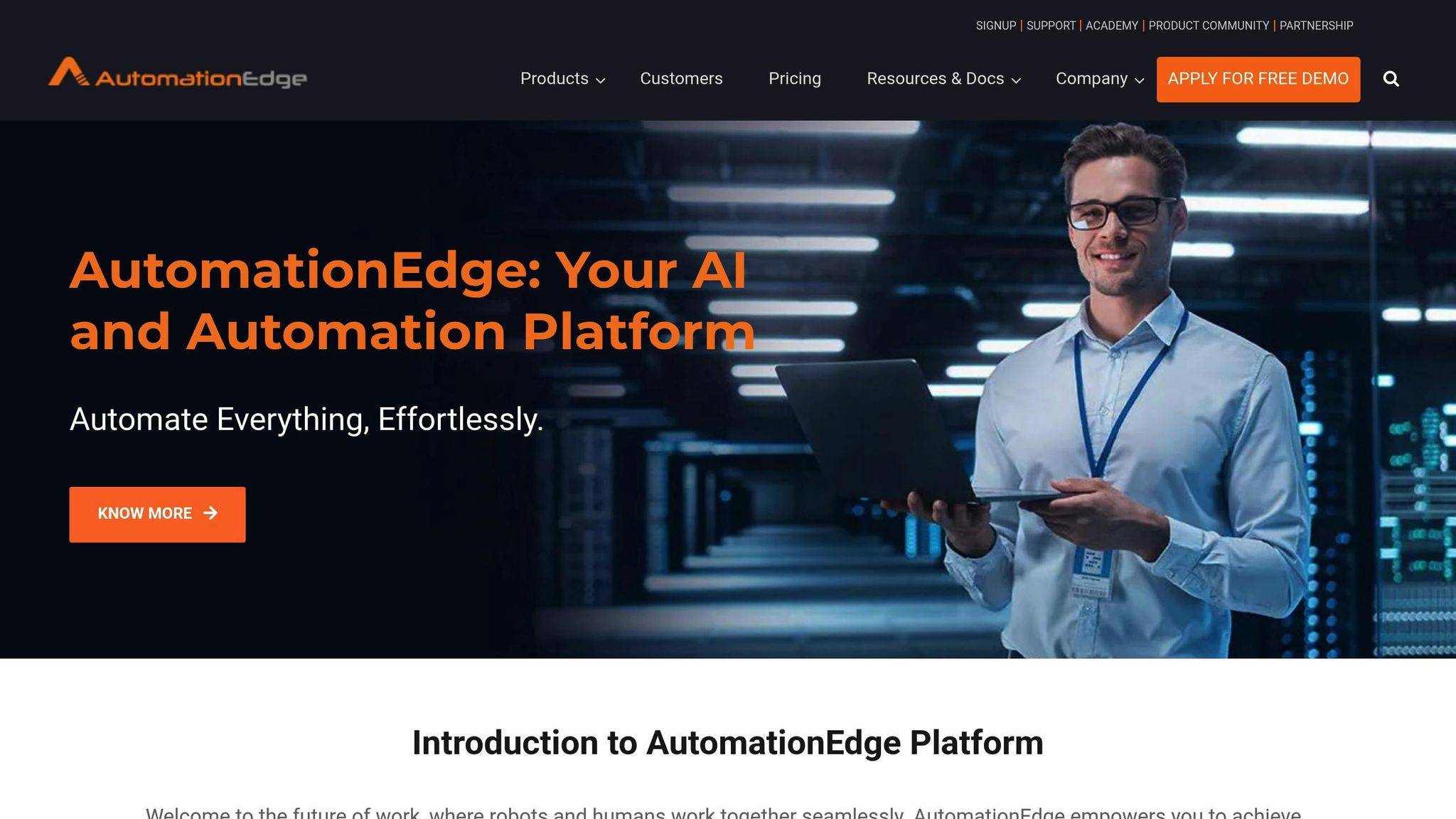
AutomationEdge is an all-in-one automation platform that combines artificial intelligence, robotic process automation, and intelligent document processing. With over 750 pre-built connectors for various business applications, it provides a robust solution for simplifying and optimizing operations.
At the heart of AutomationEdge lies its Orchestrator - a centralized tool that enables users to design, schedule, and monitor intricate workflows in real time. This approach ensures smooth coordination of AI workflows across multiple systems, enhancing efficiency and reducing manual effort.
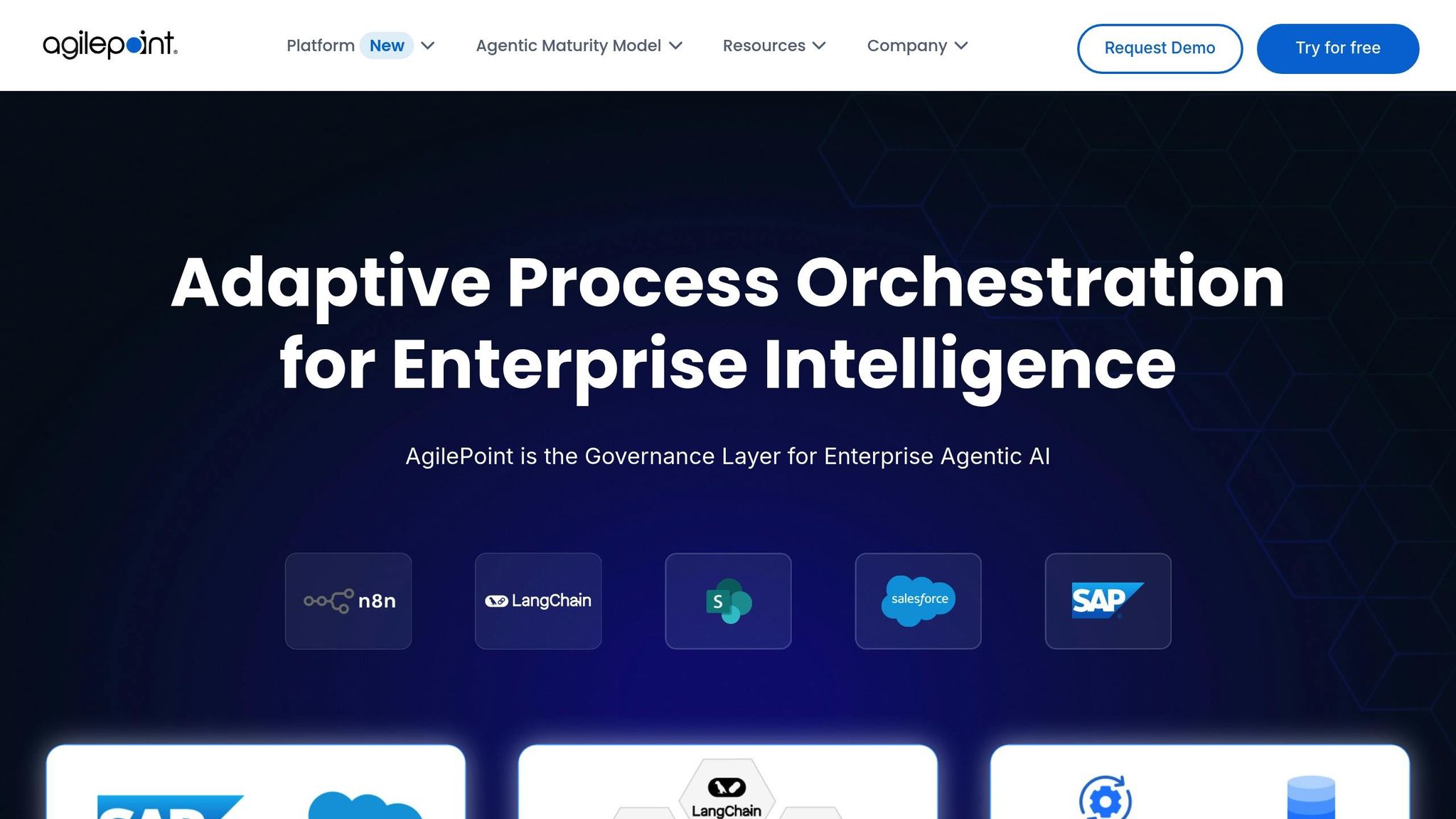
AgilePoint brings AI-powered workflow automation to businesses, combining efficiency with strong governance. Its AI Control Tower acts as a central hub, managing third-party AI agents through a Universal Governance Wrapper. This ensures compliance, security, and accountability at every step.
What sets AgilePoint apart is its focus on trustworthy automation. The platform offers complete auditability of agent actions and outcomes, policy-driven governance, and real-time monitoring with contextual alerts. These features address a major concern for businesses scaling AI-driven workflows: maintaining control and transparency. This level of oversight lays the groundwork for top-tier security measures.
AgilePoint is built with security at its core, holding ISO 27001 certification. Independent assessments have confirmed that AgilePoint’s platform - available on both on-premises and cloud options - meets ISO 27001:2013 standards for cloud security and information management.
The platform also boasts SOC2 Type II and SOC3 reports, offering third-party validation of its security, availability, processing integrity, confidentiality, and privacy controls. For regulated industries, AgilePoint supports HIPAA-compliant deployments, complete with access controls, encryption, and detailed audit logs .
AgilePoint’s security architecture is designed with multiple layers of protection. Data at rest is encrypted using AES 256 or higher, with periodic key rotation, while data in transit is secured with TLS 1.2 or higher. The platform adheres to a secure software development lifecycle, incorporating security requirements, threat modeling, and rigorous testing at every stage.
To maintain its robust security posture, AgilePoint conducts annual and post-release penetration tests, along with bi-weekly vulnerability scans. Any identified issues are prioritized and resolved through a structured patching process. This comprehensive framework ensures the platform can handle even the most demanding and regulated workflows with confidence.
AgilePoint excels in managing intricate workflows that span multiple departments, requiring both automation and strict governance. Role-based security ensures clear boundaries for access permissions, whether for internal teams or external partners. For example, a $6 billion defense manufacturer leveraged AgilePoint to enhance regulatory compliance, turning what was once a costly challenge into a competitive edge .
With its secure infrastructure, AgilePoint’s AI Control Tower provides transparent oversight for every automated process. Jesse Shiah, Co-founder and CEO of AgilePoint, highlights the importance of this capability:
"Observability is one of those mission‑critical business challenges companies deploying these digital forces have, in knowing what this digital workforce is up to."
As organizations expand their AI initiatives, governance becomes even more critical. Shiah underscores the need for trust in enterprise AI:
"There are a lot of agent frameworks out there. Technology can do it - but can you put it in a real environment and trust it? That's why governance is truly important."
AgilePoint incorporates adaptive, enterprise-grade safeguards into every application, designed to manage AI’s unpredictability while maintaining governance. This approach makes it an ideal solution for organizations that must balance innovation with risk management and compliance requirements.
Selecting the right AI workflow automation platform involves weighing features, security measures, scalability options, and cost structures. Below is a detailed comparison of key players in the market:
| Platform | Key Features | AI Model Support | Security & Compliance | Scalability | Cost Structure |
|---|---|---|---|---|---|
| Prompts.ai | Unified interface for 35+ LLMs, real-time FinOps cost controls, side-by-side performance comparisons, and prompt workflow management | GPT-5, Grok-4, Claude, LLaMA, Gemini, Flux Pro, Kling, and more | Enterprise-grade governance with built-in audit trails | Pay-as-you-go TOKN credits; scalable for small teams to Fortune 500 companies | Personal: $0–$99/month; Business: $99–$129 per member/month |
| Workato | Pre-built connectors, recipe-based automation, intelligent data mapping, and enterprise app integration | OpenAI GPT models with custom AI model integration via APIs | SOC2 Type II, GDPR compliance, and field-level encryption | Cloud-native architecture designed for enterprise workloads | Custom enterprise pricing |
| UiPath | Robotic process automation, AI-powered document processing, process mining, and citizen developer tools | Integrates with UiPath AI models and major cloud AI services | ISO 27001, SOC2, and HIPAA compliance options | Supports horizontal scaling for departmental needs | Subscription-based; starts at $420/month per user |
| AutomationEdge | RPA capabilities with AI integration, cognitive automation, business process management, and a low-code platform | Leverages natural language processing and computer vision capabilities | Enterprise security framework with role-based access controls | Modular architecture supporting distributed deployments | Quote-based pricing model |
| AgilePoint | AI Control Tower, Universal Governance Wrapper, policy-driven governance, and real-time monitoring | Supports third-party AI agent management and multi-model orchestration | ISO 27001, SOC2 Type II, SOC3, and HIPAA-compliant options | Enterprise-grade scalability available on-premises and in the cloud | Custom enterprise licensing |
This table highlights the unique strengths of each platform, helping organizations identify the best fit for their needs. Prompts.ai stands out for its unified interface, which simplifies access to over 35 leading AI models, and its flexible pay-as-you-go TOKN credit system, making it cost-efficient for a wide range of users.
While other platforms like Workato excel in pre-built integrations and UiPath shines with its document processing capabilities, Prompts.ai offers a streamlined approach by consolidating tools into a single, user-friendly platform. This not only reduces setup time but also ensures better governance and cost alignment with actual usage.
The five U.S.-based AI workflow automation platforms highlighted here showcase cutting-edge solutions designed to simplify operations and lower costs for organizations. Take Prompts.ai, for example - it provides access to more than 35 leading AI models through a single, unified interface. Its flexible pay-as-you-go TOKN credit system can slash AI software expenses by up to 98%, transforming AI from a fixed cost into a scalable resource. Each platform offers unique strengths tailored to different business needs.
This push for innovation stems from a growing demand for platforms that integrate effortlessly with existing systems while prioritizing strong security measures and clear pricing models. As outlined in the platform overviews, the success of AI workflow automation depends on key factors like seamless integration, robust security, and adaptable cost structures. Companies that adopt platforms with dependable governance and compliance capabilities are better equipped to grow sustainably while staying aligned with regulatory standards.
A unified interface is reshaping AI workflow automation by bringing together multiple tools into a single platform. Features like real-time performance comparisons, built-in audit trails, and centralized governance not only save time but also enhance operational oversight. This approach allows businesses to achieve tangible returns on their investments while reducing the complexity of setup and management. Such consolidation reflects the larger trend toward efficient, streamlined AI automation.
For U.S. businesses, leveraging these platforms means unlocking new levels of productivity, simplifying workflows, and staying ahead in a competitive market. Embracing interoperable AI workflow solutions is essential for achieving long-term growth and success in today’s increasingly automated economy.
Prompts.ai prioritizes data security and compliance, especially for businesses in tightly regulated industries. The platform uses advanced encryption to protect sensitive data, ensuring it's secure both during transit and while stored.
It also aligns with key compliance frameworks like GDPR, HIPAA, and SOC 2, giving businesses peace of mind that their operations meet rigorous legal and industry standards. Regular audits and updates keep the platform in step with changing regulations, making it a dependable choice for secure and compliant automation.
A pay-as-you-go TOKN credit system brings several advantages for businesses using AI to streamline workflows. One of the biggest perks is flexibility - you only pay for what you actually use. This eliminates hefty upfront expenses and allows you to adjust usage as your needs evolve, making it a practical choice for businesses of any size.
Another significant benefit is cost transparency and control. With this system, you can keep a clear view of your spending, helping you stick to your budget without surprises. By tying costs directly to actual usage, your investment stays focused on driving your operational goals. For companies looking for efficient and adaptable AI solutions, this model offers a straightforward and effective way to manage resources.
Prompts.ai simplifies workflows across departments by automating repetitive tasks and minimizing manual labor. This allows teams to dedicate their energy to higher-level, strategic initiatives. The platform connects with over 35 large language models, offering advanced AI-powered tools that foster collaboration and boost productivity.
By bringing workflow automation into one unified system, Prompts.ai breaks down silos, enhances communication, and ensures operations run more efficiently across teams - all contributing to stronger business performance.


